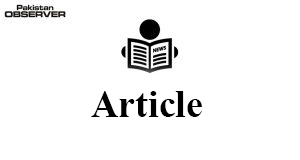Dr Nosharwan A Abbasi
COVID-19 has disrupted education worldwide in an unprecedented way. Millions of students have not been able to continue learning in schools, universities, vocational training institutions, and adult learning programs. Most governments around the world temporarily closed educational institutions in an attempt to contain the spread of the COVID-19 pandemic. The closure of educational institutions started back in February when China completely closed schools due to pandemic. Until March more than 190 countries either partially or fully closed their educational institutions. These nationwide closures impacted hundreds of millions of students.
Students, teachers and parents were not prepared for this situation and faced a wide range of challenges particularly dealing with the online mode of teaching or e-learning. Both school-going children and higher-level students such as college or university students experienced remote learning which affected their emotional side of learning. This phenomenon of remote learning is changing relationships between students, teachers and parents as well as highlights the importance of ensuring students’ and teachers’ well-being in times of crisis. COVID-19 appeared as an add-on challenge for the education system in Pakistan when the government decided to close all educational institutions back in March.
A prominent challenge that affected a large number of students was inadequate facilities and infrastructure of the internet to support online learning. Particularly, university students faced problems with online lectures due to poor internet connection and living in remote areas. Students were staying at their home and teachers were asked to deliver lectures online using different software such as zoom, Microsoft teams etc. It was not only a challenge for students but also for teachers as they were also in their hometowns and they were also facing internet issues.
In the wake of online classes challenge, students who had internet access started raising voice on Twitter and they managed to create trending topics such as #SuspendOnlineClasses, #BoycottOnlineClasses etc. This lash back clearly shows the lack of infrastructure to deliver online lectures. We adopted an online class system following the trends from China and other western countries, but we ignored the realities of poor infrastructure and management.
At the school level, the concept of online education was conceived merely as teaching using WhatsApp groups and sending recorded voice notes. It was a challenge for teachers to record lectures and teach students using WhatsApp and a major responsibility was sifted on to parents’ shoulders. WhatsApp mode of learning became a nightmare for parents and created a huge mess for them. School management so far was blackmailing the government, but they started building pressure on parents and students. Merely to collect monthly fee, owners of private institutions forced parents and teachers to adopt WhatsApp based learning. Primary level students who never used WhatsApp and particularly mobile phones for educational purposes were forced to attend lectures on WhatsApp. Moreover, due to the pandemic students were promoted to the next level without exams based on their previous results. This scenario also created a mess for many students and the results surprised many students. Even at the end of 2020 and the beginning of the New Year, students are still struggling with online education issues. They are still asking their teachers how they will conduct final exams, which will be the state of classes in 2021, and many similar questions.
Crisis situation raised questions on the value offered by educational institutes globally. And parents around the world have realized the importance of online education and home-schooling. Various discourses have started arguing that home-schooling can be the best solution for many students and parents. It can be convenient, innovative and socio-economic friendly to bring the home-schooling concept. However, the literacy rate at large in societies like Pakistan can be a major challenge in home-schooling. Educational institutes need to reinvent or innovate the learning environment in order to remain relevant. Online education has become a new normal globally at all levels of education and this new shift in education has raised the concerns of digital media literacy. Where students, teachers, and parents need to be more knowledgeable and literate when it comes to the use of technology for educational purposes.
In Pakistan, lack of digital media literacy appears as a huge gap and a major challenge particularly for parents who want their children to use digital devices for education, but they know nothing about the use, impact and challenges of digital devices. In a society where girls are discouraged to keep or use smartphones or computers with or without the internet, they need to prepare and understand the importance of the use of digital devices for educational purposes. So far we discussed the challenges of women education in Pakistan but over time, many new challenges such as the use of digital devices for education purposes have emerged as major threats for female students. A few imminent questions must be answered such as: Will their parents allow them to use a mobile phone or computer? Will their parents allow them to use internet-enabled devices and particularly WhatsApp? Will parents allow their girl childs to opt online mode of education?
—The writer holds a PhD from Communication University, China.










